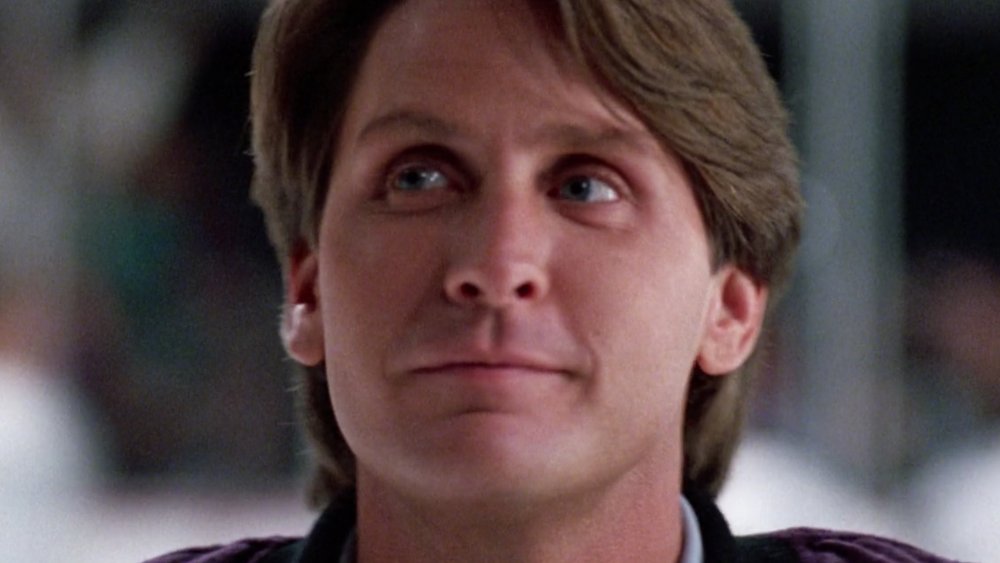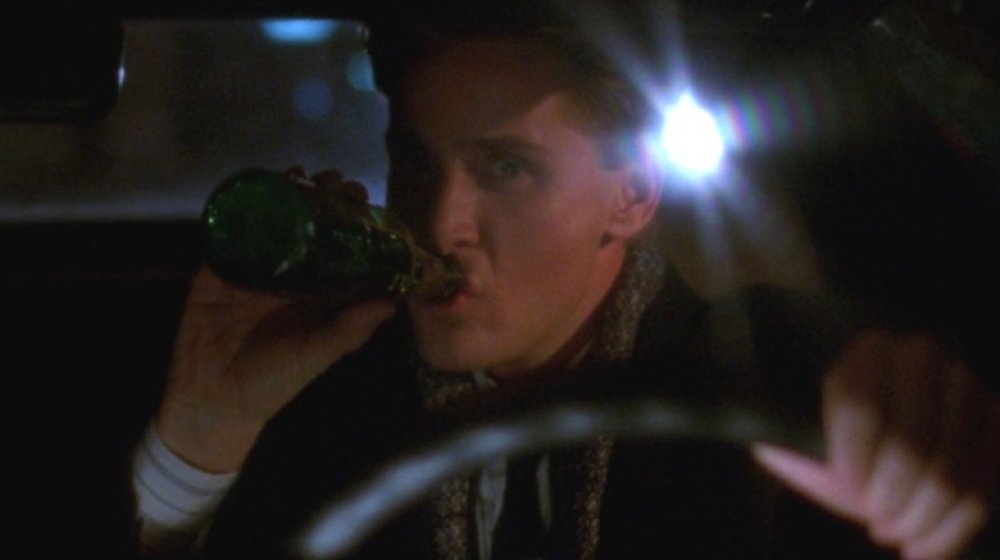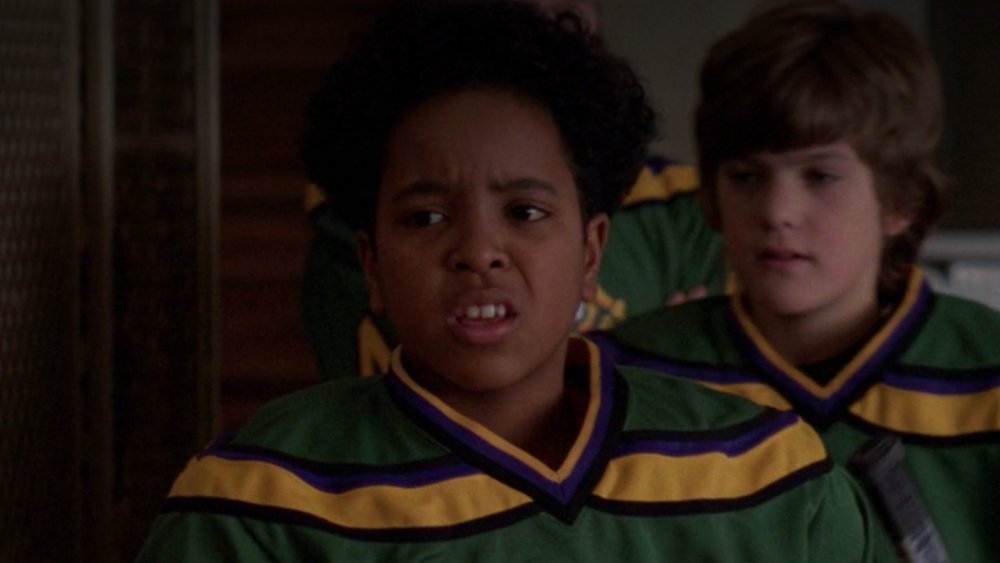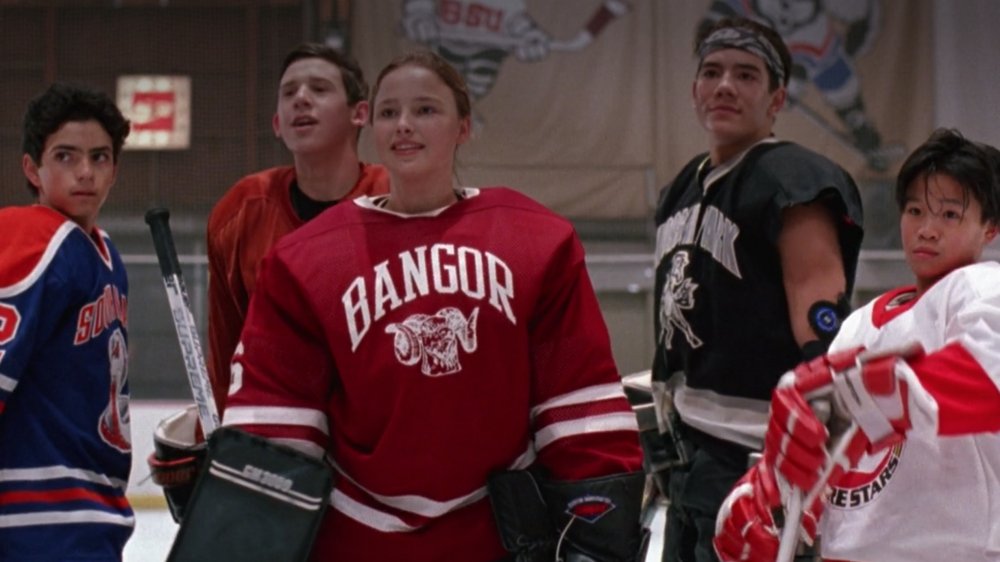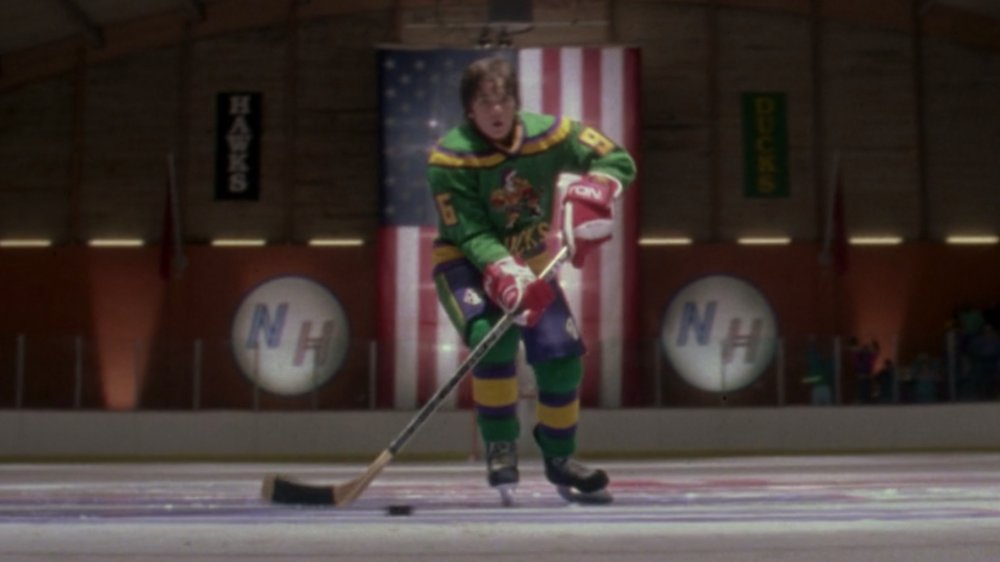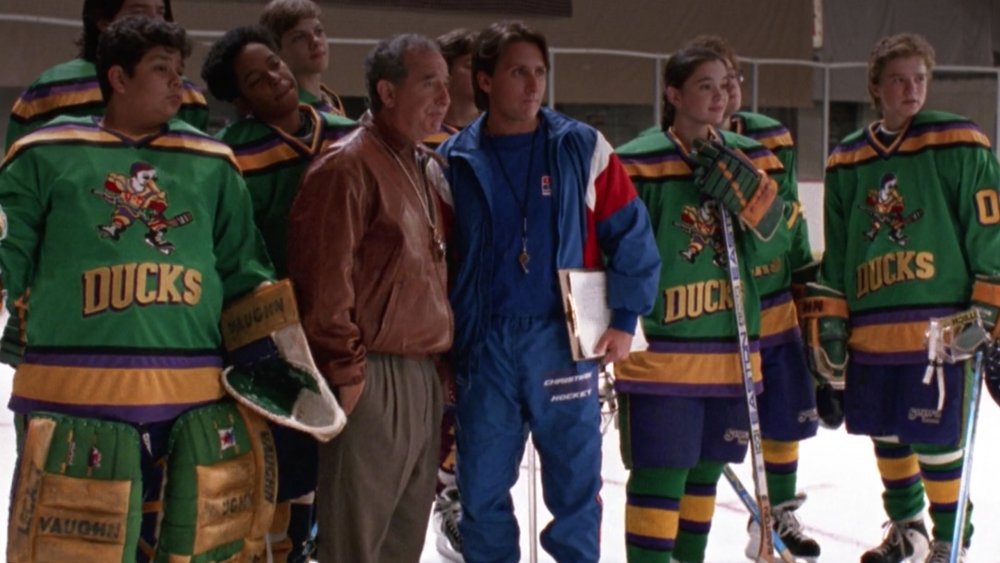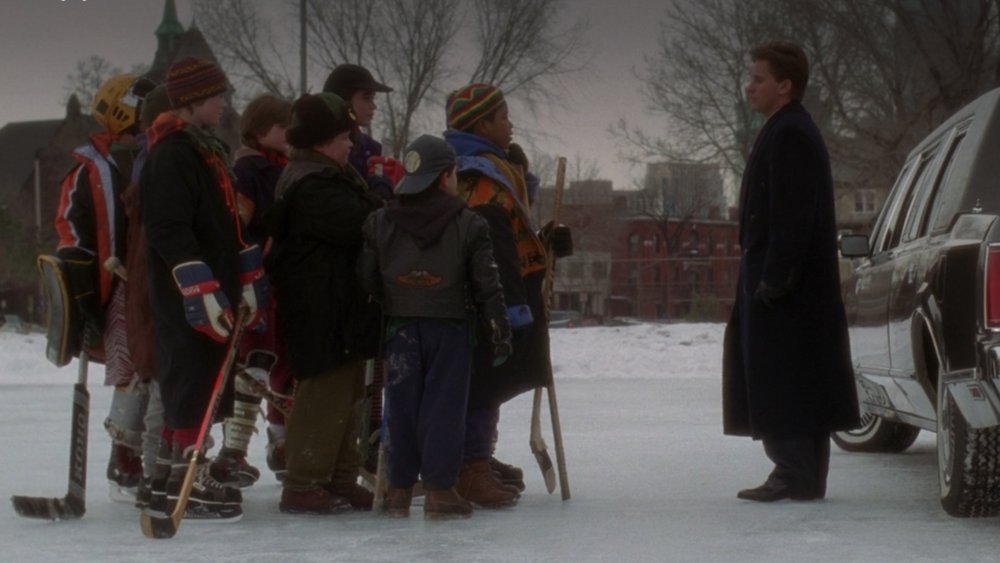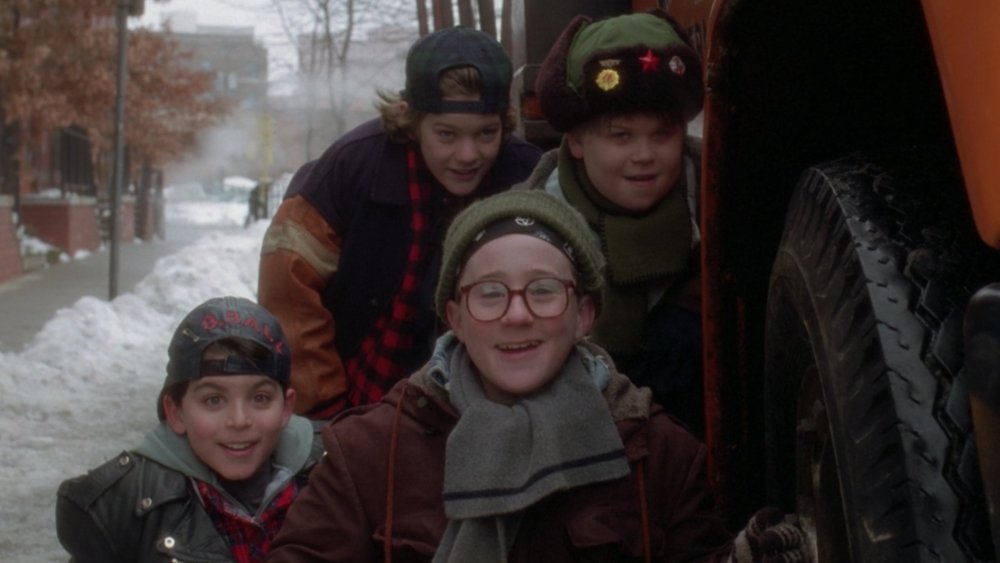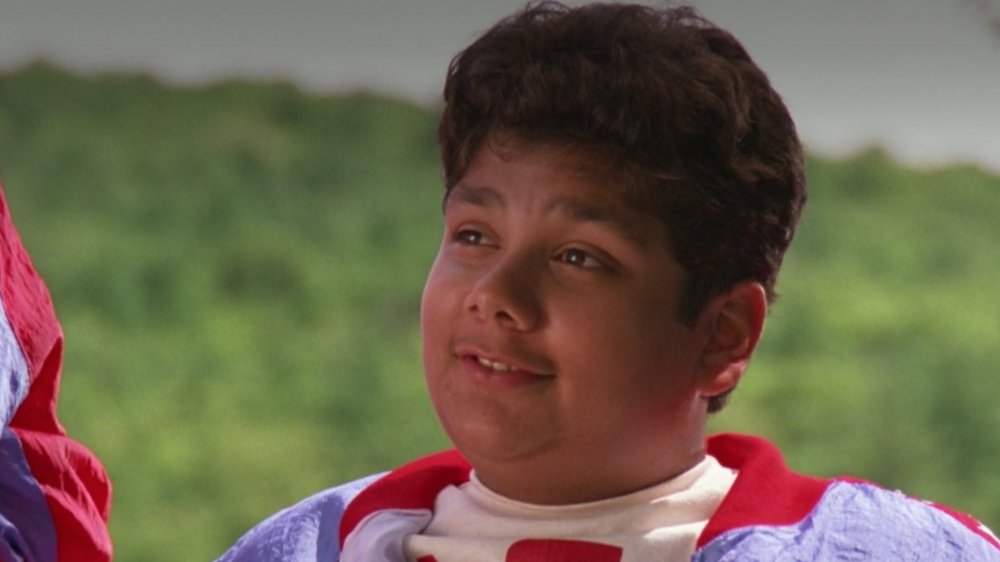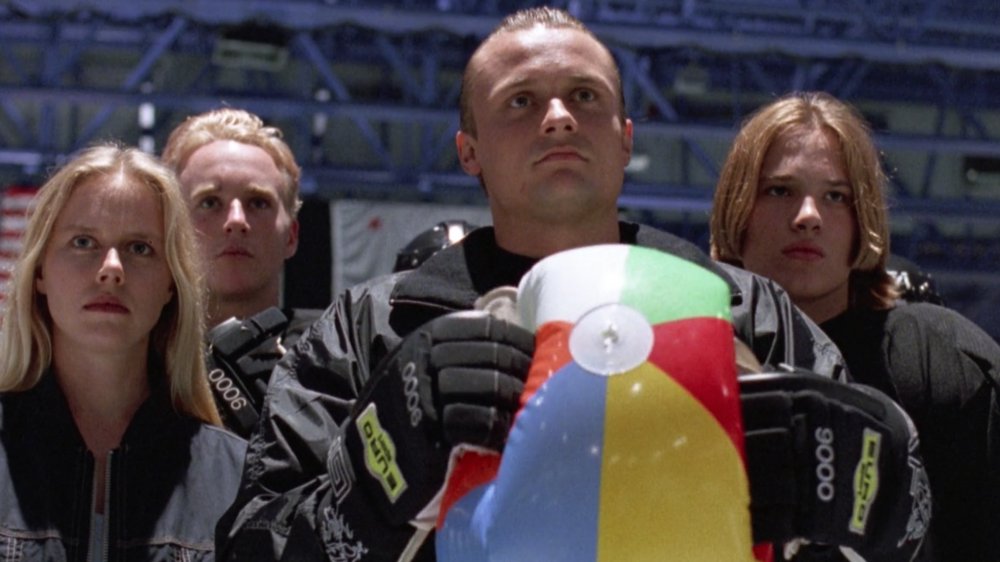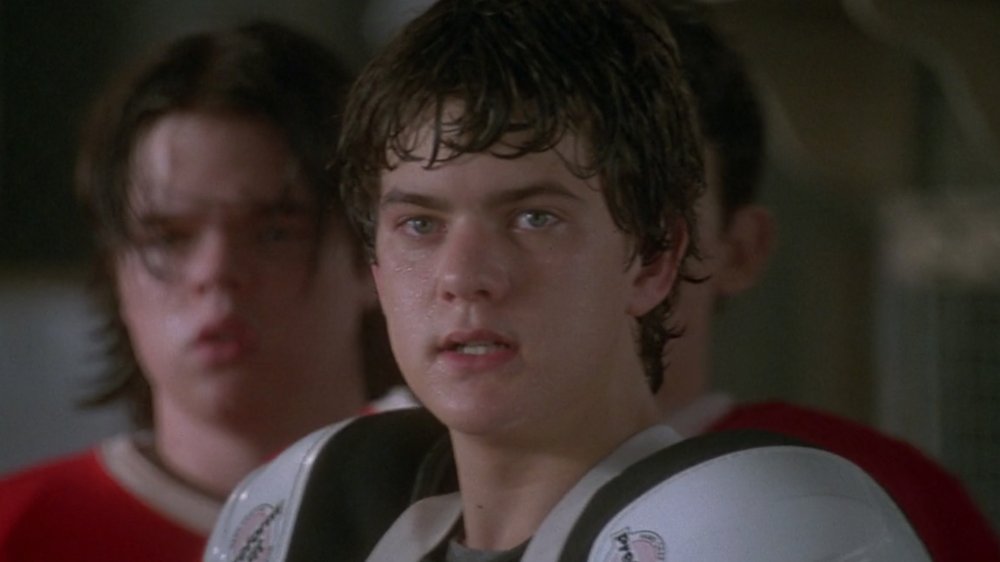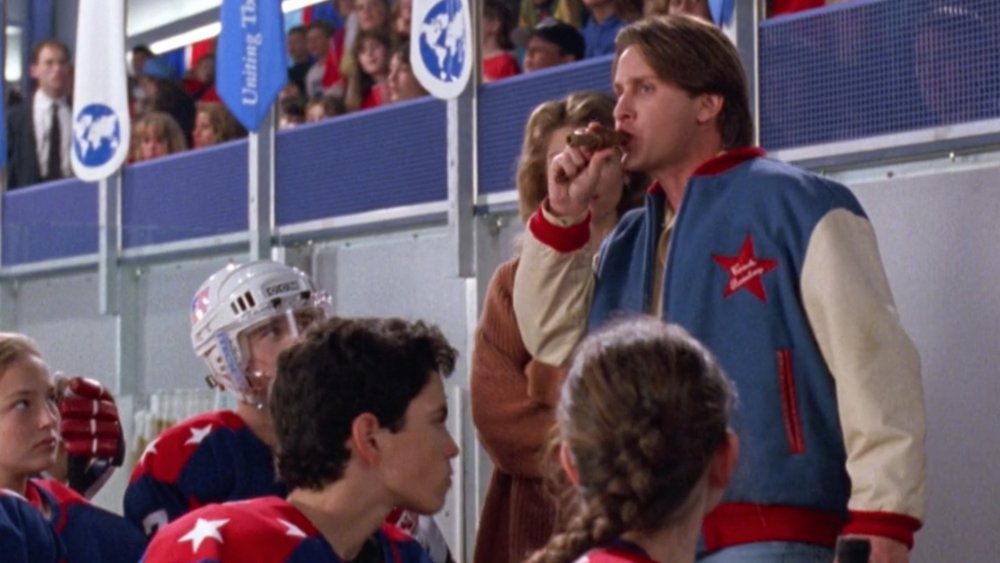Things Only Adults Notice In The Mighty Ducks Franchise
The might of Emilio Estevez has traveled through the decades and remains etched into our memories thanks to a delightful flick about a ragtag group of peewee hockey players from Minnesota. The Mighty Ducks may have only performed modestly in the box office (all three movies combined grossed only $119 million), but thanks to the glory of VHS tapes and childhood nostalgia, it has remained as a major cultural moment of the '90s. There was even a short-lived Mighty Ducks cartoon series most people forget even exists (for good reason). Enjoying the story of The Mighty Ducks is an essential part of an entire generation's childhood.
It has been over 25 years since the first film hit theaters. Most of us have since donated our rollerblades and lost track of those dusty VHS tapes. But the internet transcends time and breathes life into the remnants of the past, and now there's Disney+! We can introduce our own kids to the power of the "knucklepuck!" The lens of adulthood can prove to be a much different viewing experience, though. Younger audiences will still be as delighted as ever at the knee-slapping ice-capade, but there are many things in The Mighty Ducks that only adults will notice.
Adults will be surprised about Gordon Bombay's drunk driving
The events of the legendary hockey team have become so ingrained in our psyche that adults may have forgotten how all this craziness began. When we first meet Gordon Bombay (Emilio Estevez), he's far from the caring hockey coach looking to foster a love of the game. He's a cutthroat attorney who is adamant about being the king of his domain and being treated as such. The soulless suit speeds through the snowy streets of Minnesota in his Porsche, one hand on the steering wheel, the other pouring alcohol down his throat. Not quite the Disney opening we remember.
The whole DUI ordeal smooths over quickly. Bombay doesn't even seem too worried about repercussions, going so far as to represent himself in court. What we know of DUIs today is that they can destroy careers, cost thousands, and result in months of court hearings. Not the case for our favorite hockey coach. Bombay's boss at the law firm works out a deal with the judge. His punishment is having to coach a peewee hockey team — a pretty light slap on the wrist, but Bombay throws a fit the whole time. Even more laughable about the backlash surrounding his lawlessness is that he's kept on with his salary at the firm and also given a private chauffeur. We're not to sure whether to be annoyed with the inaccuracies in how the legal system works or angry with an accurate representation of repercussions in the white-collar community.
"Cake eater" is a weird insult. It's so PG it hurts
There are terms which slip into our ear canals as children and become part of who we are. They remain buried in our brains, shrouded in normalcy. It may be over 25 years until we hear a word said out loud again and realize that it's actually kind of weird. An insult that followed through The Mighty Ducks is the term "cake eater," to which Adam Banks (Vincent LaRusso) is usually referred. The name-calling feels so innocent that it hurts.
Turns out that the quirky dig is one of the more authentic chunks of dialogue and comes straight from Minneapolis. The term refers to Edina, Minnesota, an affluent suburb. Residents in poorer neighborhoods closer to the city refer to folks from Edina as "cake eaters" due to their wealthy upbringings — stating that they can get their cake and eat it, too. It is a slur against the cozy town that stands to this day. Residents of Edina, meanwhile claim that people are jealous of their little slice of paradise. "Cake eater" is a uniquely Minneapolis slur which anyone from the area will immediately connect with, but thanks to The Mighty Ducks, it has nestled itself into a little corner of pop culture.
Most of the players on Team USA didn't belong on Team USA
After the success of the first Mighty Ducks film, Disney immediately ordered up another serving and cranked it through production at amazing speed. In D2: The Mighty Ducks, the stakes are upped to a national level when the team is recruited to represent all of the United States. Now, we know this story is about our favorite youth hockey team, and they're the bee's knees, but it's a big leap to have recruitment for Team USA consist of grabbing an entire team whose only major victory is a single peewee hockey title.
The writers do a decent job of explaining the whole process by wrapping the recruitment in public relations. In that regard, it makes a bit of sense: People do love a feel-good story, and the miracle of the Ducks is a tearjerker. Still, it's unlikely that the reputation of the entire country would be placed on the shoulders of a team comprised mostly of some random kids from Minnesota.
Added to the lack of logic is the shortcomings of all the new additions. The speedster has trouble stopping. The puck handler won't stop showboating. The muscle is a testosterone-loaded bully. It's hard to believe that recruitment surrounding Team USA would consist of the Ducks and a few random players from Texas and the Olympic figure skating awards stand. And we obviously have to keep Goldberg on as the goalie because, well, it's Goldberg. Any kid will tell you to not look too much into it.
The triple deke isn't that complicated of a move
In The Mighty Ducks, there is a mysticism surrounding Gordon Bombay's signature maneuver: the "triple deke." The almighty deke is considered a revolutionary shooting technique pioneered by a young Bombay in his peewee days. The cloudy camera effect and touching musical number helps paint a picture of a magical hockey technique, but for any adult grounded in reality ... it's not that impressive. We're not sure how we didn't realize it as kids, but it's pretty easy to read the triple deke. They present it like a legendary fakeout, but it basically looks like the equivalent of a crossover in basketball, except slower.
Actually, most of the Ducks' trademark moves are pretty useless. In D2, we were introduced to the "knucklepuck," and it was a real barn burner — but it's all dazzle. Not only is it wildly unpredictable, but an entire plan needs to be laid out to give Russ (Kenan Thompson) ample time to set up his shot. The entire ordeal is impractical.
The legality of the "flying V" has also been a source of heated debate among hockey fans. Some claim it would be illegal due to the inability of players to check someone not in control of the puck (several Ducks players would be in the penalty box all at once), and others claim it would be an applicable equivalent to a Hail Mary, and technically, the puck maneuvers were legal. Either way, it's unlikely that any real hockey team would leave their goal so incredibly wide open.
The Mighty Ducks shows that refusing to change is an admirable trait
As we crawl through each moment of existence, we learn the unfortunate fact that nothing ever stays the same. Being adaptable is part of what makes us human. The Mighty Ducks appears to have a different life lesson in mind: Latch on to that 12-year-old identity and never let go. Charlie and the gang are given a platform to play hockey on a national level in D2. Yet still, they aren't able to rise to the challenge unless they are able to be the Ducks. This novel concept is easy to accept for any child looking to hold on to their sense of wonder, but the rest of us wizened souls know that this is no way to navigate life.
This theme flows through the entire trilogy. The players are given a scholarship to a prestigious school in D3, and with it comes opportunities for many of the players from impoverished neighborhoods to seek a better life. This matters little to the gang, because they don't like that the name on their jerseys says "Warriors." It's only after their new coach allows them to slap on the Ducks jerseys that they're finally able to muscle out a win. It's like having someone at the office who can't work unless they have their favorite T-shirt on.
The Mighty Ducks is about kids from poorer upbringings getting opportunities in a sport they normally wouldn't
As wholesome as The Mighty Ducks experience is, some of its more endearing qualities sail right over kids' heads. At its heart, the franchise is about a group of underprivileged children getting an opportunity to play in a sport which costs money to play. Hockey requires time at the ice rink, pads, skates, and possibly doctor visits for broken bones — all luxuries which can't be afforded by folks with jobs that don't come with a standard insurance package and a salary. The Ducks aren't able to succeed as a team until they get the necessary gear to play the sport. This only happens when Bombay convinces his boss (Mr. Ducksworth) to sponsor the team — he names the team the Ducks to cater to his ego and get financing. This aspect of the film makes the experience more heartfelt for older audiences, and our only complaint is that they didn't focus on it more.
The first Mighty Ducks film was an accurate portrayal of the issues involved with breaking into the sport and disguises it as a silly kid's movie. The second film begins to steer away from that message, but the third film comes back around to expand on this overarching theme. We remember D3 being boring as kids, but that's probably because we were wondering why there wasn't more Emilio Estevez. (He was only on screen for a total of 20 minutes.)
Almost all of the Ducks' parents are nonexistent
A big part of the appeal for younger audiences in The Mighty Ducks isn't just the groovy soundtrack but the fact that young hockey players live a life seemingly devoid of parental supervision. Any adult watching the team's tumultuous journey will find themselves questioning why so many of the players' parents are leaving them to be watched after by someone doing community service for drunk driving.
The Mighty Ducks is a time capsule from before the dawn of the helicopter parent. The players spend their days goofing off in parks, rollerblading through malls, and tricking would-be purse thieves into snatching satchels full of feces. The early '90s was a glorious time to be a kid, but The Mighty Ducks stretches the credulity of limited parental presence to its limits. At least giving a glimpse of parents at the games would have been an easy way to close this loophole, but it doesn't matter to the kids in the audience, so why bother?
Goldberg is a terrible goalie
The crowd favorite among The Mighty Ducks cast is undeniably Goldberg (played by Shaun Weiss), the lovable goofball of a goalie. His screen time increased through each film, and it's understandable why. Younger audiences get a kick out of the buffoonery, but any adult watching wonders why the heck the team keeps him as the goalie. In the first film, it's understandable: It's a poor hockey team, and they make do with the goalie they have — he is affable, after all. Despite his lovable nature, the team spends most of their major games down by several points scored against Goldberg.
Once they are thrust into the role of Team USA, they get a new addition in the form of Julie "The Cat" Gaffney. She received her nickname from her quick reflexes, and it shows in her performance on the ice. It's displayed over and over that Julie is the better goalie (she ultimately ends up with the goal save that wins the Ducks the title in D2), but Goldberg keeps moseying his way back between the posts. That's a move most coaches would avoid if they wanted to win.
It's pretty clear that the writers didn't know much about Iceland
The antagonists who stand out the strongest in the entire franchise are the Iceland team in D2. For an entire generation, Iceland became a cold, stark source of duck-killing villainy. Any kid looking at Iceland's coach, with his slicked-back hair and evil smirk, will immediately make a direct connection to "bad guy." Older audiences with any worldly sense of culture or geography will be curious about the choice, especially when you consider that the entire country of Iceland is smaller than the state of Minnesota.
The Mighty Ducks' writer Steve Brill stated in an interview with Time that he went with Iceland because most people don't know anything about the country. He told Time, "Russia would be too obvious [...] And the eastern European thing, I felt again it just was a little too dire or political. I was like, 'Iceland, oh my God. People don't quite know much about it. It's got that Nordic mystique. I can make them essentially these blond-haired, blue-eyed menacing villains with funny accents and a weird culture.'" Mission accomplished, Brill. The lack of Icelandic knowledge still shows a bit in the film, though. Some of the players come off sounding Russian. It's obvious that all the "Iceland" actors just dyed their hair blonde and were told to sound Eastern European and intimidating.
Charlie is a big, mopey baby
While screen time gets spread out among the cast rather well, it is apparent (especially in D3) that the primary protagonist in our heroes' journey is Charlie (played by Joshua Jackson). The good-hearted Minneapolis native is the "heart and soul" of the Ducks. A charming aspect of his character is his singular desire to simply play hockey with his friends ... a desire which becomes overbearing by the end of the trilogy. Charlie grabbed on to the overarching lesson to never change and refused to let go.
Those of us with kids will probably start to get annoyed with his mood swings. Sure, the movie is about hockey and its purity and all that, but anytime Charlie doesn't get to play hockey — with the coach he wants, wearing the jersey he wants — he becomes a mopey toddler. Each film in the franchise features a moment when Charlie is upset and Bombay has to give in to the whims of his tantrum. You could argue that a majority of The Mighty Ducks is everyone attempting to keep Charlie happy. In the third film, Fulton (Elden Henson) goes so far as to tell Charlie he's not sure if he wants to play hockey for the rest of his life. Charlie looks at Fulton as though he stole his last lollipop. The team eventually caves in and is renamed to the Ducks by the end of D3. That being said, Charlie's motivation consists of wanting to play hockey, and that's what the movie is about, so it works.
Isn't a duck call used to kill ducks?
An inspiring call to arms for The Mighty Ducks is obviously the duck call. The application makes perfect sense on a literal level. Plus, it's just quirky enough get a smile and arrives at the optimal moment for tears of joy. Charlie uses the device to round up the team at the beginning of D2, and Bombay uses it to let the Ducks know that his heart and soul are realigned. There is no more perfect of a rally for the franchise than the duck call ... unless you think about what a duck call is actually used for.
The practical application for the duck call is much more macabre in the real world. The device is used to lure ducks into range so hunters can shoot them and roast their corpses before devouring them for sustenance — hardly a rousing application for a kids' movie. In actuality, the duck call in The Mighty Ducks should serve as a warning to the players to stay away from danger lurking nearby, like Iceland players or parents.
